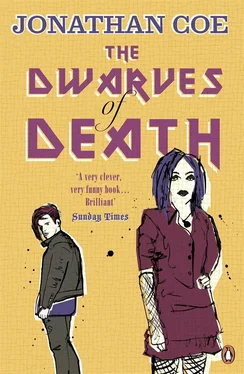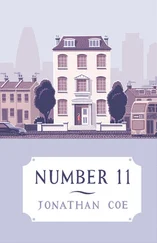‘It’s about attitude,’ said Martin, ‘and dynamics.’
‘Well forgive my naivety,’ I said, ‘but I always thought it was about music.’
‘The music’s fine,’ said Martin. ‘There’s nothing wrong with the music. We’re talking eye-levels here.’
‘If I stand up, I can’t use my pedals.’
‘ We both stand up,’ said Harry, ‘and we manage to use our pedals.’
‘I’m sorry, this is just incredible to me. I mean, next you’re going to be asking me to wear one of those keyboards around my neck, like I was selling ice-cream.’
‘We just want you to stand up, that’s all.’
‘You think Vladimir Ashkenazy has to stand up when he’s playing the Moonlight Sonata? To establish his authority?’
‘That’s different,’ said Jake. ‘A classical pianist establishes authority through a set of quite distinctive signs, such as the suit he wears, and the way he walks on to the stage and sits down. It’s a question of semiotics.’
‘Whose side are you on?’ I asked.
‘Yours, actually.’
The others looked at him in surprise.
‘I think Bill should carry on sitting down. Otherwise it upsets the balance. At the moment we’ve got two people standing up and two people sitting down. That communicates poise, and equilibrium.’
‘Fuck equilibrium,’ said Martin. ‘Think feet and inches.’
I stood up.
‘This is completely ridiculous.’
‘William, will you for God’s sake sit down!’ shouted Harry.
‘I thought you wanted me to stand up.’
‘I want you to stand up now and sit down on stage. I mean, I want you to sit down now and stand up on stage!’
‘Cool it boys, will you?’ said Chester. ‘There’s no point in losing our tempers.’
‘Why don’t you just get yourselves a taller keyboard player and be done with it?’
‘We’re not getting personal about this, Bill. We value your contribution to the band. You know that.’
I sighed. ‘Does anybody want another drink?’
It turned out that everybody wanted another drink, except me: I had only asked because I wanted to go up to the bar and talk to Karla again. I wasn’t even able to do that, because Chester and Harry insisted on sharing the next round. While they were away, rather than talking to the other two, I sat down at the piano. Much to my surprise, it was unlocked. There was no jukebox in the pub and the level of conversation was high enough for me to be able to play softly without anybody noticing.
I played through the first eight bars of ‘Tower Hill’ twice, and my finger rested on the last note, the high E flat. I still hadn’t managed to get any further. But now some part of me remembered a harmony I had heard once — a minor seventh chord, with the melody starting a fourth above the root. In which case, E flat would give… B flat minor seven. I tried it. It sounded nice. A melodic figure came quite readily:

Harmonizing this was easy. All it needed in the second half of the bar was to flatten the fifth. It never ceases to delight me that you can alter a chord by just one semitone and produce a completely different effect like that. This figure would come to rest, of course, on a C natural, with an A flat major seven being held for the whole bar. That C natural also gave me the clue for the next development — a repeat of the previous two bars, only a minor third lower, and with a C seven substituted for the second chord. The pattern of the melody stayed broadly the same, too, so that the whole four-bar sequence now played like this:

I was beginning to feel pleased with this piece — not because it was in any way original, or because it was anything special technically, but because it was coming to express my feelings towards Madeline very clearly. I wondered if I should play it to her when it was finished, and explain that it was written with her in mind. Perhaps then she would understand the dissatisfactions I felt, the frustration and the longing to get closer.
But it was a long time since I had played the piano to Madeline. After our first meeting, when it had been music which brought us together, I had assumed that it would always be like that — that it would always be an area of shared understanding between us. As it turned out, I was being naive. When I started playing the piano at Mrs Gordon’s house, the first time that Madeline allowed me to visit her there, she came running into the room and told me to stop in case it woke the old lady up. It was a lovely old Bechstein grand, too.
‘What’s the matter?’ I said. ‘Didn’t you like what I was playing?’
‘She’s asleep. You’ll wake her.’
It was early evening: the beginning of the end of a bright summer’s day. I had come straight over from the record shop and the smell of the City was just starting to wash off. I couldn’t believe my luck, to be spending the evening in such a nice part of town, with such a lovely woman, in such a beautiful house. There were huge oil paintings on the walls in every room — family portraits, Madeline told me — and heavy red velvet curtains and Regency furniture, and splendid marble fireplaces topped with gilt-framed mirrors. I had seen nothing like it since the days when my parents used to take me around stately homes.
‘I’ve made some tea,’ she said. ‘Shall we go upstairs?’
She had a large, sunny room on the second floor, as well as a bathroom and a small kitchen all to herself. She served Earl Grey tea in bone china cups and didn’t offer me milk or sugar. There was a television, a telephone, a hi-fi, a large single bed, a writing desk, a dressing-table and two high-backed but comfortable armchairs. The walls were decorated with nineteenth-century landscapes. It was a warm and friendly room but it said nothing about Madeline herself, except that she was obviously happy not to impose her own personality on to it. One slightly unexpected feature was that a small crucifix had been placed on top of the dressing-table.
‘Is she religious, this woman?’ I asked (meaning Mrs Gordon).
‘No, not especially.’ She saw what had prompted my question. ‘That’s mine.’
‘I didn’t know you were a Catholic.’
‘Well how could you? You’ve barely met me.’
I sipped my tea, chastened, and said, ‘I went through a brief religious phase once. I used to go to communion every week. Apart from anything else, it’s still the only place you can get a drink first thing on a Sunday morning.’
She didn’t laugh or even smile, and I felt that I had struck a wrong note.
‘What would you like to do this evening?’ she asked. ‘Shall we go out somewhere?’
‘Sure,’ I said. ‘Anywhere you like.’
We walked to a little Hungarian restaurant on the Kings Road. I tried putting my arm around her waist on the way, but could feel no encouragement, so I withdrew it at the first opportunity. Not that she asked me to or anything. It was just a sense I had.
‘What are your plans?’ she asked me, after we had ordered our food.
‘Pardon?’ It seemed an odd question.
‘What are you going to do? With all this music and everything. Where’s it going to lead?’
‘I don’t know, I hadn’t really thought. That’s not why I’m doing it.’
‘Why are you doing it?’
‘Well, you know… I’m only twenty-three, after all. I’ve just got to make myself known, play as often as possible — there’s no saying what might happen. I’ve got this friend, Tony, who used to teach me, and he thinks that I’ve got the potential — ’ I couldn’t think why I was telling her this, so I decided to stop. ‘Anyway, what about you? How much longer are you going to look after Mrs Gordon?’
Читать дальше














